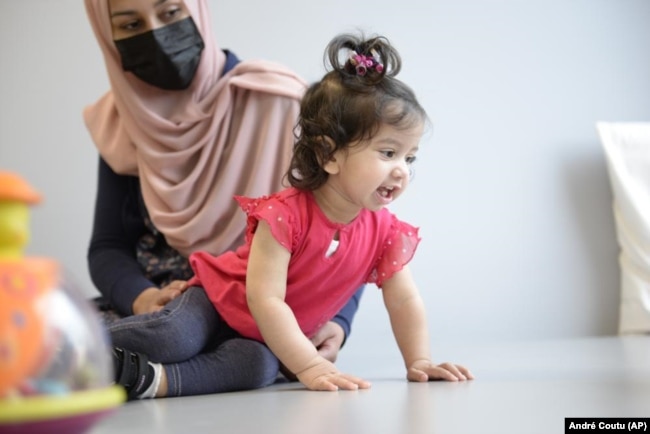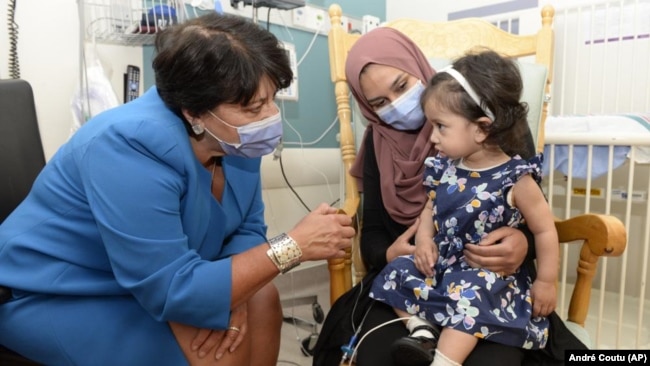人体の不思議を痛感します。
細かい仕草から、意識とは無関係に発動されている生命維持装置に至るまで、完璧なプログラミングと自動修正機能。
VOAで英語を学びましょう!!
出生前に致命的な病気を治療することが初めて可能に(和訳)
For First Time, Doctors Treat Deadly Disease Before Birth
2 hours ago
カナダのオトワに住む生後16カ月の女の子、アイラ・バシールちゃんは、医師が生前に新しい方法で治療した結果、元気になりました。彼女は、姉妹のうち2人が死亡した希少な遺伝性疾患を持っています。
ポンペと呼ばれるこの病気は、体内で重要なenzyme酵素の一部または全部が作られなくなるものです。しかし、新しいケーススタディでは、アイラちゃんに効果があると思われる新しい治療法が紹介されています。
この少女の両親は最近、AP通信に対し、娘は今や活動的で幸せな少女であり、成長も正常であると話しています。
夫妻は以前、2歳半のザラちゃんと8カ月のサラちゃんの2人の娘をこの病気で亡くしています。3人目の妊娠は、この病気、病のために終了しました。
アイラちゃんの未来は希望に満ちていますが、不確かです。
カレン・フォン・キー・フォン医師は、オタワ病院でfetuses【fíːtəs】胎児を扱う医学の専門家です。彼女はアイラちゃんに治療を施しました。この新しい方法は、カリフォルニア大学サンフランシスコ校の母体胎児精密医療センターの共同ディレクターであるティッピ・マッケンジー博士が開発したものです。
マッケンジー博士はフン・キー・フォン博士と研究内容を共有しました。「私たちは皆、この家族のためにこれを実現しようという気持ちになりました」と、マッケンジー氏は語っています。
このケースでは、医師が母親の胃から重要な酵素を送り込みました。その後、酵素はumbilical cordへその緒の中に導かれます。アイラちゃんは胎児の発育24週頃から、2週間おきに6回の治療を受けました。
プラネッシュ・チャクラボルティー医師は、アイラちゃんの家族の世話を何年もしてきました。AP通信によると、この治療が非常に効果的だったのは、胎児がまだ成長しているうちに、早期に治療を完了したことだと言います。
ポンペは新生児10万人に1人以下の割合で発症します。この病気は、細胞内のグリコーゲン(貯蔵糖)を分解する酵素を作る遺伝子が変化することによって起こります。この酵素が減少または除去されると、グリコーゲンは体全体に危険なほど蓄積されるのです。
さらに、アイラちゃんを含む最も深刻な影響を受けた赤ちゃんは、体が治療酵素をブロックしてしまう免疫状態にあります。その結果、最終的に治療が効かなくなるのです。アイラちゃんの早期治療により、この免疫反応が抑えられることが期待されています。
ポンペ病の赤ちゃんは、摂食障害と筋力低下を経験します。心臓が非常に肥大していることもよくあります。未治療の場合、ほとんどの赤ちゃんは生後1年の間に心臓や呼吸の問題で死亡してしまいます。アイラちゃんの両親には、亡くなった女の子に加えて、13歳の息子と5歳の娘がいます。どちらの子もこの病気にはかかっていません。
今のところ、医師たちはこの治療法が一般に受け入れられるものになるかどうかを見守っています。クリスティーナ・ラム博士は、ワシントン大学およびシアトル小児病院の生化学遺伝学専門家です。彼女は、新しい治療法の結果が患者にとってより良いものであるかどうかを明確に示すには、しばらく時間がかかるだろうと言っています。
アイラちゃんは免疫系の薬と、毎週5〜6時間かかる酵素治療を受けていまう。新しい方法が見つからない限り、アイラちゃんは生涯この治療を続けることになりそうです。
両親は、彼女がハイハイを始めたときなど、一歩一歩の進歩がとても特別なものだと言います。
「毎回驚かされます。」と母親のソビア・クレシさん。「私たちは本当に恵まれています。私たちはとてもとても恵まれています。」
For First Time, Doctors Treat Deadly Disease Before Birth
Ayla Bashir, a 16-month-old girl from Ottowa, Canada, is healthy after doctors used a new method to treat her before she was born. She has a rare genetic disease that killed two of her sisters.
The disease, called Pompe, causes the body to fail to make some or all of an important enzyme. But a new case study describes the new treatment method that seems to be working for Ayla.
The young girl’s parents recently told The Associated Press their daughter is now an active, happy girl who is growing normally.
The couple previously lost two daughters, Zara, 2½, and Sara, 8 months, to the condition. A third pregnancy was ended because of the disease, or disorder.
The future for Ayla is hopeful but uncertain.
Dr. Karen Fung-Kee-Fung is a medicine specialist who works with fetuses at The Ottawa Hospital. She gave Ayla her treatments. The new method was developed by Dr. Tippi MacKenzie, co-director of the Center for Maternal-Fetal Precision Medicine at the University of California, San Francisco.
MacKenzie shared her research with Fung-Kee-Fung. “We were all motivated to make this happen for this family,” MacKenzie said.
In this case, doctors delivered important enzymes to the mother through her stomach. The enzymes were then guided into the umbilical cord. Ayla received six treatments every two weeks, starting at about 24 weeks of fetal development.
Dr. Pranesh Chakraborty has cared for Ayla’s family for years. He told the AP that what made the treatment highly effective was completing it early, while the fetus was still developing.
Pompe affects fewer than 1 in 100,000 newborns. It is caused by changes in a gene that makes an enzyme that breaks down glycogen, or stored sugar, in cells. When that enzyme is reduced or removed, glycogen builds up dangerously throughout the body.
In addition, the most severely affected babies, including Ayla, have an immune condition in which their bodies block the treatment enzymes. This eventually stops the treatment from working. The hope is that Ayla’s early treatment will reduce that immune response.
Babies with Pompe disease have trouble feeding and experience muscle weakness. They often have very enlarged hearts. When left untreated, most babies die from heart or breathing problems during the first year of life. In addition to the girls who died, Ayla’s parents have a 13-year-old son and a five-year-old daughter. Neither of those children were affected by the disorder.
For now, doctors are waiting to see whether the treatment can become a generally accepted form of treatment. Dr. Christina Lam is a biochemical genetics specialist at the University of Washington and Seattle Children’s Hospital in Seattle. She said it will take some time to clearly demonstrate whether the results of the new treatment are better for patients.
Ayla receives drugs for her immune system and weekly enzyme treatments that take five to six hours. Unless a new method is found, Ayla is likely to continue the treatments throughout her life.
Her parents say that every step of progress, such as when she started to crawl, has been very special.
“It amazes us every time,” said her mother, Sobia Qureshi. “We’re so blessed. We’ve been very, very blessed.”
Words in This Story
enzyme – n. a protein that changes or effects chemical reactions in the body
fetus – n. unborn offspring or animals or humans still in the uterus
motivate – v. to make someone or oneself encouraged or determined to do something
umbilical cord – n. the tube connecting the unborn baby to its mother, delivering food and oxygen
immune – adj. protected against something harmful such as disease by the formation of antibodies
crawl – v. to move forward on hands and knees

